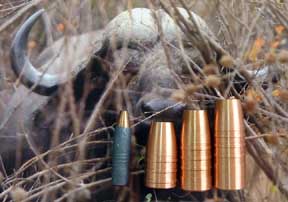

 The Accurate Reloading Forums
The Accurate Reloading Forums  THE ACCURATE RELOADING.COM FORUMS
THE ACCURATE RELOADING.COM FORUMS  Rifles
Rifles  Big Bores
Big Bores  Ladder testing?
Ladder testing?Go  | New  | Find  | Notify  | Tools  | Reply  |  |
| One of Us |
Do any of you all ladder test you're big bores? If so at what distance would you ladder test a 375,416,458. I'd assume you'd use a longer distance on say the 375 than the bigger calipers. On my .30cals I usually do 300 yards. | ||
|
| Moderator |
No, I've never "ladder tested" a big bore...or a small bore. I select a number of 85% of maximum loads with the bullet I want to use and proceed from there. George  | |||
|
| One of Us |
What is a ladder test? DRSS | |||
|
| One of Us |
Bill, one method is to choose one powder and bullet combination. Working on the assumption that you have a rough zero, get target paper or a piece of cardboard that is 36" tall. Draw a vertical line in the center. About six inches from the bottom draw a horizontal line. Using that as a sighting point, start shooting loads. Increase the charges, for a big bore, about 3/10ths of a grain at a time, and shoot 3-shot groups. They will walk up the line as velocity increases. At some point, two of those groups will be closer than any previous ones. That is a harmonic node. The barrel is a tuning fork of sorts. Those two loads are close. Tune from there. A lot of people start with the bullet ogive ten-thousandths of an inch off the rifling. Seating deeper in twenty-thousandths of an inch increments, is the fine tune. The only thing that complicates it, is making sure your loaded round will fit in the magazine and feed. hope this helps, Rich | |||
|
| One of Us |
I do something similar but not exactly the same. Since my priority for a big rifle is a chosen bullet at full velocity, I will load a pressure sequence of one round per grain and shoot them over the chronograph. I shoot them all at the same target, and often as not they start hitting together right around the top charge. If the load doesn't produce the desired velocity, I can quit and save hard to find and expensive bullets. If the speed is there, I'll take what seems to be a solid working maximum and load 10. Loads that will print three different charge weights into a decent group don't go sour every time the sun goes behind a cloud. Also, I don't really care how well something shoots at an idle. A side benefit is by the time you've found the maximum load with a few bullets, you have a real good idea of which bullets will shoot together and at what charge they will do it at. It's surprisingly easy to get a big gun to shoot. It figures that the ones where accuracy doesn't matter much are so easy to get along with. | |||
|
| One of Us |
true, but the accuracy desired for big bores is not measured to three decimal places. Your parameters differ markedly. | |||
|
| One of Us |
My method is somewhat different, but not much. I pick one powder and one projectile, then start somewhere around a grain or so above minimum. I load four of each, going up a grain at a time (sometimes .5 grain with smaller cases), with the projectile seated about .010" off the lands. When I have my 20 loaded rounds, I go to the range. I shoot five four-shot groups. Most of the time I end up with something workable, significantly less than MOA. And typically, as has been said already, it is at or near the top of the load data. On rare occasion I have surpassed the max load in a load book without signs of excessive pressure, but that is rare. | |||
|
| One of Us |
I ladder test all my rifles including big bores. It really simplifies the load work up process. I use a bullseye target camera which makes it incredibly fast and easy. | |||
|
| Powered by Social Strata |
| Please Wait. Your request is being processed... |
|

Visit our on-line store for AR Memorabilia

